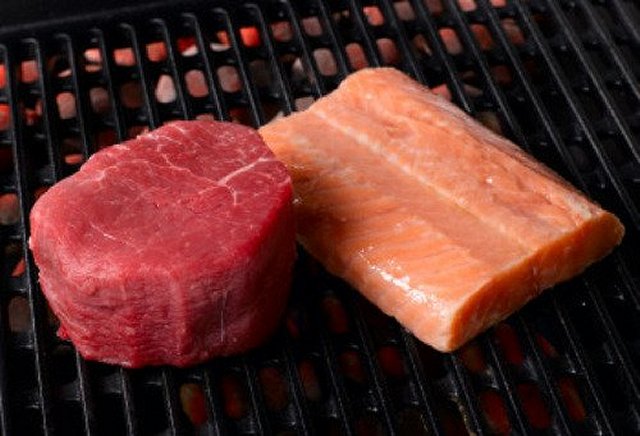Meat vs Fish as a Source of Protein
by TVance | January 9, 2019 7:01 am
Some of the best sources of protein in your daily diet is meat and fish. Both meat and fish are great protein sources, but which is better for you? The goal for getting enough protein in your diet is to get enough protein in the foods you eat without eating too many calories or eating too much saturated fat, which is generally considered to be bad for you.
 [1]
[1]
Fish is probably better for you because it has the same amount of protein than most cuts of meat and only has a quarter of the fat that meat contains.
How much protein do you need?
Protein serves many functions in the body. Not only is it important in building cellular structures and tissues of the body, but it is what most enzymes in the body are made from. It is also the backbone of most hormones and antibodies used to fight off pathogens. Protein helps to store iron and you need protein in order to move your muscles.
Protein can be used as an energy source if you don’t have enough glucose around. When you eat protein, it is broken down into amino acids, which are absorbed into the bloodstream to be used as substrates for making new proteins.
You need to eat protein regularly because it isn’t stored in the body. The recommended daily allowance for protein in women is about 46 grams per day, while the recommended daily allowance for protein in men is about 56 grams of protein per day.
Fish Protein
A single serving of fish is about 3 ounces of fish or the amount of fish that can fit in the palm of your hand. The following fish types contain about 90-130 calories and about 19-26 grams of protein: halibut, perch, flounder, tuna, haddock, and cod.
This is about 39 percent of the recommended daily allowance of protein per day in men and 48 percent of the recommended daily allowance of protein in women. This compares to beef and pork, which are higher in calories (150-235 calories per serving) and contain 18-27 grams of protein per serving.
Besides protein, fish contains a lot of essential fatty acids that help in many bodily functions, including the making of the cell membranes of the cells of the body and the organelles inside the cells. Most fish you eat are low in fat (about 1-2 grams per serving). The fat that is in fish is of a healthier type than is seen in meat and can actually decrease cholesterol levels.
Halibut contains 0.77 grams of omega 3 fatty acids, while tuna contains about 1.4 grams of omega 3 fatty acids per serving. Other types of fish have less fatty acids in them but still have more omega 3 fatty acids than is found in meat. Besides protein, fish have omega 3 fatty acids, which can decrease inflammation in the body.
Other Nutrients in Fish
Fish has healthy proteins in it and is also a good source of other types of nutrients. Some of these include vitamin B12, vitamin B6, and magnesium. These are nutrients that are supposed to be good for your heart, which makes fish a better choice than meat if you are trying to get protein in your body.
Magnesium is known for relaxing the blood vessel and heart muscle tissue, lowering blood pressure. The B vitamins rid the blood of homocysteine, which is linked to heart attacks.
Fish are also lower in cholesterol when compared to meat. A serving of fish contains 40-70 milligrams of cholesterol in it, while meat has much higher cholesterol levels. This is about 13-23 percent of the recommended daily allowance of cholesterol (less than 300 milligrams per day are recommended).
Meat Protein
Various types of meat are good sources of protein but not necessarily, any more protein than you will find in fish.
Good sources of meat protein include the following:
• Chicken breasts—27 grams per 4-ounce serving
• Pork—13 grams per 3-ounce serving
• Ground turkey—21 grams per 3-ounce serving
• Eye round steak—20 grams per 4-ounce serving
What this means is that both fish and meat are good sources of protein but that fish, by virtue of being lower in cholesterol and fatty acids, are a better food choice when you want to take in protein in your diet.
- [Image]: https://alternativeresourcesdirectory.com/wp-content/uploads/2019/01/Meat-Vs-Fish-As-A-Source-Of-Protein.jpg
Source URL: https://alternativeresourcesdirectory.com/news/meat-vs-fish-as-a-source-of-protein